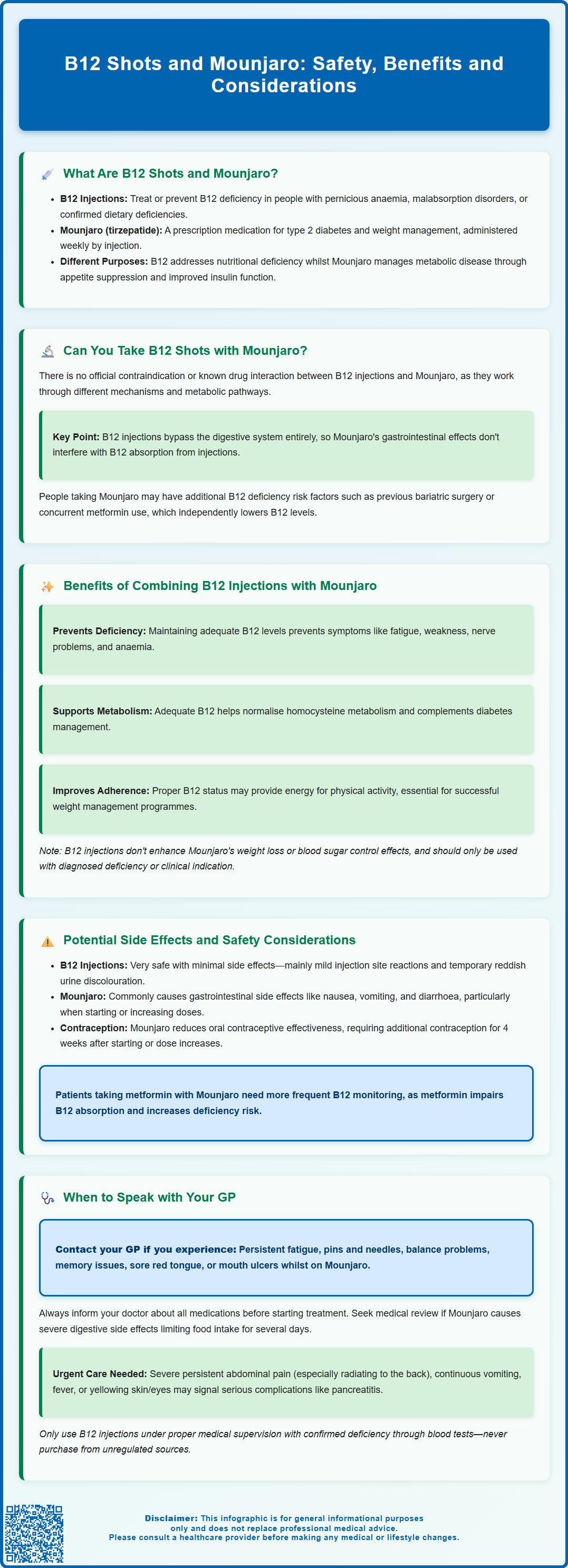B12 shots and Mounjaro are two distinct injectable treatments that serve entirely different clinical purposes. Vitamin B12 injections, typically hydroxocobalamin in the UK, are prescribed to treat or prevent B12 deficiency, supporting red blood cell formation and neurological function. Mounjaro (tirzepatide) is an MHRA-licensed medication for type 2 diabetes and weight management, working as a dual GIP and GLP-1 receptor agonist. Whilst there is no contraindication to using both treatments together, understanding their separate mechanisms and potential nutritional implications is essential for safe, effective care. This article examines the compatibility, benefits, and safety considerations when combining B12 injections with Mounjaro therapy.
Summary: B12 injections and Mounjaro can be used together safely, as there is no known pharmacological interaction between these treatments.
- Vitamin B12 injections treat diagnosed deficiency, whilst Mounjaro (tirzepatide) is a dual GIP/GLP-1 receptor agonist for type 2 diabetes and weight management.
- No official contraindication exists, as both work through entirely different mechanisms and metabolic pathways.
- Mounjaro's appetite suppression and reduced food intake may increase risk of nutritional deficiencies over time, making B12 monitoring important.
- Individuals taking metformin alongside Mounjaro face higher B12 deficiency risk and may require more frequent monitoring.
- B12 injections should only be used for diagnosed deficiency; they do not enhance Mounjaro's weight loss or glucose-lowering effects.
- Always inform your GP about all medications to ensure comprehensive monitoring and appropriate nutritional support during treatment.
Table of Contents
What Are B12 Shots and Mounjaro?
Vitamin B12 injections are a form of supplementation used to treat or prevent vitamin B12 deficiency. B12 (cobalamin) is an essential water-soluble vitamin that plays a crucial role in red blood cell formation, neurological function, and DNA synthesis. In the UK, hydroxocobalamin is the standard form used for intramuscular injections on the NHS. B12 injections are typically prescribed for individuals with pernicious anaemia, malabsorption disorders, or confirmed dietary deficiencies. For those without malabsorption, oral B12 supplements are generally preferred. In the UK, B12 injections are available on NHS prescription for medically diagnosed deficiency.
Mounjaro (tirzepatide) is a prescription medication licensed by the MHRA for the treatment of type 2 diabetes mellitus and for weight management in adults with obesity (BMI ≥30 kg/m²) or overweight (BMI ≥27 kg/m²) with at least one weight-related comorbidity. It is a dual glucose-dependent insulinotropic polypeptide (GIP) and glucagon-like peptide-1 (GLP-1) receptor agonist. Mounjaro works by enhancing insulin secretion in response to meals, suppressing glucagon release, slowing gastric emptying, and reducing appetite. It is administered once weekly via subcutaneous injection and should be used alongside diet, physical activity and behavioural support.
Both treatments are injectable therapies but serve entirely different clinical purposes. B12 injections address a specific nutritional deficiency, whilst Mounjaro is a pharmacological agent for metabolic disease management. Understanding the distinct mechanisms and indications of each treatment is essential when considering their use together, particularly as Mounjaro's effects on appetite and food intake may impact overall nutritional status.
Can You Take B12 Shots with Mounjaro?
There is no official contraindication to receiving B12 injections whilst taking Mounjaro. According to the Mounjaro Summary of Product Characteristics (SmPC), these two treatments do not have a known direct pharmacological interaction, as they work through entirely different mechanisms and are metabolised via separate pathways. Vitamin B12 injections bypass the gastrointestinal tract entirely, delivering the vitamin directly into muscle tissue for absorption into the bloodstream, whilst Mounjaro acts on specific receptors to regulate glucose metabolism and appetite.
However, there are important considerations when using both treatments concurrently. Mounjaro slows gastric emptying and can cause gastrointestinal side effects such as nausea, vomiting, and reduced appetite. These effects may lead to decreased food intake and potentially impact overall nutritional status over time. Individuals taking Mounjaro, particularly for weight management, may be at increased risk of developing nutritional deficiencies if their diet becomes significantly restricted or unbalanced.
NICE guidance on weight management emphasises that medications like Mounjaro should be used within multidisciplinary weight management services that provide dietary, physical activity and behavioural support. Whilst Mounjaro itself does not directly cause B12 deficiency, the dietary changes and reduced food intake associated with its use could theoretically contribute to suboptimal nutrient intake. Additionally, some individuals taking Mounjaro may have pre-existing conditions that independently increase their risk of B12 deficiency, such as previous bariatric surgery or concurrent metformin use (the MHRA has highlighted that metformin can reduce vitamin B12 levels).
If you have been prescribed B12 injections for a diagnosed deficiency, you should continue this treatment as directed by your GP, even whilst taking Mounjaro. Always inform your healthcare provider about all medications and supplements you are taking to ensure comprehensive care.

Benefits of Combining B12 Injections with Mounjaro
Whilst there is no synergistic pharmacological benefit from combining B12 injections with Mounjaro, maintaining adequate B12 levels whilst taking Mounjaro offers several important health advantages, particularly for individuals with diagnosed deficiency or those at risk.
Preventing or correcting B12 deficiency is crucial for overall health. Symptoms of deficiency include fatigue, weakness, neurological problems (such as paraesthesia, balance difficulties, and cognitive impairment), and megaloblastic anaemia. For individuals taking Mounjaro who may be eating less due to appetite suppression, ensuring adequate B12 status helps maintain energy levels and neurological function during weight loss or diabetes management. This is particularly relevant as fatigue is a common concern during calorie restriction.
Supporting metabolic health is another consideration. Both adequate B12 levels and effective diabetes management contribute to overall metabolic wellbeing. In individuals with confirmed B12 deficiency, correction may help normalise homocysteine metabolism, as deficiency has been associated with elevated homocysteine levels. For individuals with type 2 diabetes taking Mounjaro, maintaining optimal B12 status supports comprehensive metabolic care.
Optimising treatment outcomes may be facilitated by addressing nutritional deficiencies. Individuals who feel well-nourished and energetic are more likely to adhere to treatment regimens and maintain healthy lifestyle changes. For those taking Mounjaro for weight management, adequate B12 levels may help sustain the energy needed for increased physical activity, which is an important component of weight management programmes.
It is important to note that B12 injections should only be used when there is a diagnosed deficiency or clear clinical indication. They are not recommended as a general supplement for individuals with normal B12 levels, and there is no evidence that B12 injections enhance the weight loss or glucose-lowering effects of Mounjaro. For those without malabsorption issues, oral B12 supplements may be appropriate if dietary intake is insufficient.
Potential Side Effects and Safety Considerations
When considering B12 injections alongside Mounjaro, it is important to understand the side effect profile of each treatment independently, as well as practical safety considerations.
Side effects of B12 injections are generally rare and mild. Hydroxocobalamin, the form most commonly used in the UK, may cause:
-
Injection site reactions (pain, redness, or swelling)
-
Temporary reddish discolouration of urine
-
Rarely, hypersensitivity reactions
-
Very rarely, hypokalaemia in severely deficient patients when treatment is initiated (potassium levels should be monitored in severe deficiency)
B12 injections are considered very safe, with no upper tolerable limit established, as excess B12 is excreted in urine.
Side effects of Mounjaro are more common and primarily gastrointestinal. These include:
-
Nausea, vomiting, and diarrhoea (very common, especially during dose escalation)
-
Reduced appetite and abdominal discomfort
-
Constipation
-
Risk of hypoglycaemia when used with insulin or sulphonylureas
-
Pancreatitis and gallbladder disease have been reported
-
Thyroid C-cell tumours have been observed in animal studies, though the relevance to humans is unknown
Important safety considerations when using both treatments include:
-
Mounjaro can reduce the effectiveness of oral contraceptives due to delayed gastric emptying. Additional contraceptive methods are advised for 4 weeks after starting Mounjaro and after each dose increase.
-
Proper injection technique and site rotation are essential. Both medications are given by injection, though in different sites (B12 intramuscularly, Mounjaro subcutaneously). Patients should be educated on appropriate administration techniques for each.
-
Monitoring for signs of B12 deficiency remains important, particularly if Mounjaro-related side effects lead to prolonged reduced food intake or vomiting. Symptoms such as persistent fatigue, neurological symptoms, or glossitis should prompt medical review.
-
Individuals taking metformin alongside Mounjaro face increased risk of B12 deficiency, as metformin is known to impair B12 absorption, and may require more frequent monitoring.
Patients should never adjust dosing of either medication without medical supervision and should report any concerning symptoms to their healthcare provider promptly. Suspected side effects can be reported via the MHRA Yellow Card Scheme.
When to Speak with Your GP About B12 and Mounjaro
Proactive communication with your GP is essential when considering or using B12 injections and Mounjaro together. You should arrange an appointment if you are currently taking Mounjaro and experience symptoms suggestive of B12 deficiency, including persistent tiredness or weakness, pins and needles or numbness in hands or feet, difficulty with balance or walking, memory problems or confusion, a sore, red tongue (glossitis), or mouth ulcers.
Before starting Mounjaro, inform your GP if you are already receiving B12 injections, as this provides important context for your overall nutritional status and treatment plan. Similarly, if you are taking Mounjaro and your GP suggests B12 testing or treatment, ensure they are aware of all your current medications, including the dose and duration of Mounjaro therapy.
Specific situations requiring medical review include:
-
Severe or persistent gastrointestinal side effects from Mounjaro that significantly limit your food intake for more than a few days
-
You are taking metformin in addition to Mounjaro, as this combination increases B12 deficiency risk
-
You have a history of pernicious anaemia, gastric surgery, or conditions affecting nutrient absorption
-
You are considering stopping B12 injections whilst taking Mounjaro
-
You experience any unexplained neurological symptoms
-
Urgent medical attention is needed if you develop severe, persistent abdominal pain (which may radiate to the back), persistent vomiting, fever, or yellowing of the skin/eyes, as these could indicate pancreatitis or gallbladder problems
Your GP or practice nurse can arrange blood tests to check your B12 levels (serum B12, holotranscobalamin, and if borderline, methylmalonic acid levels may be used where available) and determine the appropriate frequency of B12 injections if deficiency is confirmed.
It's important to note that NHS provision of Mounjaro for weight management follows NICE technology appraisal guidance and is typically available through specialist weight management services, subject to local commissioning decisions. If you have concerns about the cost or availability of prescribed treatments, discuss this openly with your GP, who may be able to suggest alternatives or provide guidance on accessing medications through appropriate NHS channels.
Never purchase B12 injections from unregulated sources or self-administer without proper medical supervision and diagnosis.
Scientific References
- Mounjaro KwikPen 2.5mg solution for injection in pre-filled pen - Summary of Product Characteristics (SmPC).
- Mounjaro (tirzepatide) - European Public Assessment Report (EPAR).
- Tirzepatide for managing overweight and obesity. Technology appraisal guidance [TA1026].
- Metformin and reduced vitamin B12 levels: new advice for monitoring patients at risk.
- Tirzepatide Once Weekly for the Treatment of Obesity (SURMOUNT-1).
- Tirzepatide versus Semaglutide Once Weekly in Patients with Type 2 Diabetes (SURPASS-2).
Frequently Asked Questions
Is it safe to have B12 injections whilst taking Mounjaro?
Yes, there is no contraindication to receiving B12 injections whilst taking Mounjaro, as they work through different mechanisms and do not interact pharmacologically. Always inform your GP about all treatments you are receiving.
Can Mounjaro cause vitamin B12 deficiency?
Mounjaro does not directly cause B12 deficiency, but its appetite-suppressing effects may lead to reduced food intake and potentially suboptimal nutrient consumption over time. Individuals taking metformin alongside Mounjaro face increased deficiency risk.
Should I take B12 supplements if I'm on Mounjaro for weight loss?
B12 supplementation should only be used if you have a diagnosed deficiency confirmed by blood tests. If you have symptoms of deficiency or risk factors such as metformin use, speak with your GP about appropriate testing and treatment.
The health-related content published on this site is based on credible scientific sources and is periodically reviewed to ensure accuracy and relevance. Although we aim to reflect the most current medical knowledge, the material is meant for general education and awareness only.
The information on this site is not a substitute for professional medical advice. For any health concerns, please speak with a qualified medical professional. By using this information, you acknowledge responsibility for any decisions made and understand we are not liable for any consequences that may result.
Heading 1
Heading 2
Heading 3
Heading 4
Heading 5
Heading 6
Lorem ipsum dolor sit amet, consectetur adipiscing elit, sed do eiusmod tempor incididunt ut labore et dolore magna aliqua. Ut enim ad minim veniam, quis nostrud exercitation ullamco laboris nisi ut aliquip ex ea commodo consequat. Duis aute irure dolor in reprehenderit in voluptate velit esse cillum dolore eu fugiat nulla pariatur.
Block quote
Ordered list
- Item 1
- Item 2
- Item 3
Unordered list
- Item A
- Item B
- Item C
Bold text
Emphasis
Superscript
Subscript












